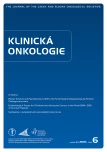Extravasation (Paravasation) of Chemotherapy Drugs – Recommendations for Standard Care in the Czech Republic based on Consolations between Representatives of the Supportive Care Group of the Czech Society for Oncology, Oncology Section of the Czech Nurses Association, and the Society for Ports and Permanent Catheters
Authors:
S. Vokurka 1; V. Maňásek 2; D. Navrátilová Hrabánková 3; S. Šípová 1; L. Turková 4; E. Hajnová Fukasová 5; Z. Sýkorová 6; Š. Kozáková 7; R. Mazúr 8; J. Wintnerová 9
Authors‘ workplace:
Onkologická a radioterapeutická klinika LF UK a FN Plzeň
1; Komplexní onkologické centrum, Nemocnice Nový Jičín
2; I. interní klinika – klinika hematologie VFN v Praze
3; Interní hematologická klinika FN Královské Vinohrady, Praha
4; Klinika onkologická FN Ostrava
5; Klinika komplexní onkologické péče, Masarykův onkologický ústav, Brno
6; Ústavní lékárna, Masarykův onkologický ústav, Brno
7; Nemocnice Znojmo
8; Klinika dětské hematologie a onkologie FN Motol, Praha
9
Published in:
Klin Onkol 2019; 32(6): 463-468
Category:
Short Communication
doi:
https://doi.org/10.14735/amko2019463
Overview
Background: Extravasation (paravasation) of chemotherapy drugs is a very significant complication in the treatment of cancer patients. Preventive and therapeutic interventions reduce the risk of this complication or the extent of its consequences. A working group of authors from expert groups prepared recommendations for standard care. Purpose: To prepare a basic summary of recommended interventions for daily practice, based on knowledge from long-term, proven, evidence-based practice or on consensus opinions of representatives of expert groups. Results: Preventive measures are essential and include early consideration of long-term venous access device indications, choice of injection site, venous line control before each chemotherapy drug application, and patient education. Interventions in cases of extravasation mainly involve the application of antidotes (dimethylsulfoxide, hyaluronidase, and dexrazoxane) and the application of dry cold or heat, depending on the type of cytostatic drug. Corticosteroids injected subcutaneously, moist heat or cooling, and compression, are not recommended. Conclusion: The recommended procedures will contribute to reducing the risk and consequences of extravasation. The range of recommended interventions can be expanded depending on individual clinical workplace policy and needs.
The authors declare they have no potential conflicts of interest concerning drugs, products, or services used in the study.
The Editorial Board declares that the manuscript met the ICMJE recommendation for biomedical papers.
Submitted: 28. 9. 2019
Accepted: 13. 10. 2019
Keywords:
nursing – extravasation
Sources
1. Pittiruti M, Capozzoli G, Delfino A (eds.). Venous access – a practical textbook. Rome: Antonio Delfino Editore 2018.
2. Maňásek V. Extravazace cytostatik – prevence a doporučené postupy. Klin Onkol 2016; 29 (2): 93–99. doi: 10.14735/amko201693.
3. Charvát J et al. Žilní vstupy dlouhodobé a střednědobé. Praha: Grada Publishing 2016.
4. Pérez Fidalgo JA, García Fabregat L, Cervantes A et al. Management of chemotherapy extravasation: ESMO–EONS Clinical Practice Guidelines. Ann Oncol 2012; 23 (Suppl 7): vii167–vii173. doi: 10.1093/annonc/mds294.
5. Mader I, Fürst-Weger PR, Mader RM et al. Extravasation of cytotoxic agents: compendium for prevention and management. New York: Springer 2010.
6. Gallieni M, Pittiruti M, Biffi R. Vascular access in oncology patients. CA Cancer J Clin 2008; 58 (6): 323–346. doi: 10.3322/CA.2008.0015.
7. SPC – DOXORUBICIN TEVA 2 mg/ml, prášek pro koncentrát pro infuzní roztok (č.j. 28185/2016). Příloha č. 3 k rozhodnutí o registraci sp. zn. sukls124962/2009.
8. SPC – Hylase “Dessau” 150 IU. Prášek pro přípravu injekčního roztoku. Příloha č. 2 k rozhodnutí o převodu registrace sp.zn.sukls26323/2013.
Labels
Paediatric clinical oncology Surgery Clinical oncologyArticle was published in
Clinical Oncology

2019 Issue 6
- Possibilities of Using Metamizole in the Treatment of Acute Primary Headaches
- Metamizole vs. Tramadol in Postoperative Analgesia
- Metamizole at a Glance and in Practice – Effective Non-Opioid Analgesic for All Ages
- Spasmolytic Effect of Metamizole
- Metamizole in perioperative treatment in children under 14 years – results of a questionnaire survey from practice
-
All articles in this issue
- Tranzice péče o onkologické pacienty z dětského do dospělého věku
- Sarcopenia in Metastatic Colorectal Carcinoma
- Rare Hereditary Burden associated with a Hypercalcemic Small-Cell Carcinoma of Cervix in a Young Female Patient
- Extravasation (Paravasation) of Chemotherapy Drugs – Recommendations for Standard Care in the Czech Republic based on Consolations between Representatives of the Supportive Care Group of the Czech Society for Oncology, Oncology Section of the Czech Nurses Association, and the Society for Ports and Permanent Catheters
- Aktuality z odborného tisku
- Spomienka na prof. MUDr. Ľudovíta Milana Jurgu, DrSc.
- Maligní onemocnění, psychika a stres. Příběhy pacientů s komentářem psychologa
- Benign Tumours and Pseudotumours Within the Porta Hepatis Masquerading as Perihilar Cholangiocarcinoma
- Epidemiological Trends for Childhood and Adolescent Cancers in the Period 1994–2016 in the Czech Republic
- Ukraine Data on Prognostic Factors and Treatment Outcomes in Patients with Peripheral T-Cell Lymphomas
- Bortezomib and Thalidomide Treatment Results in Newly Diagnosed Transplant-Ineligible Multiple Myeloma Patients are Comparable in Long-Term Follow-Up
- Expression Analysis of the Long Non-Coding RNA LINC01433 in Lung Cancer
- Clinical Oncology
- Journal archive
- Current issue
- About the journal
Most read in this issue
- Extravasation (Paravasation) of Chemotherapy Drugs – Recommendations for Standard Care in the Czech Republic based on Consolations between Representatives of the Supportive Care Group of the Czech Society for Oncology, Oncology Section of the Czech Nurses Association, and the Society for Ports and Permanent Catheters
- Rare Hereditary Burden associated with a Hypercalcemic Small-Cell Carcinoma of Cervix in a Young Female Patient
- Tranzice péče o onkologické pacienty z dětského do dospělého věku
- Bortezomib and Thalidomide Treatment Results in Newly Diagnosed Transplant-Ineligible Multiple Myeloma Patients are Comparable in Long-Term Follow-Up
